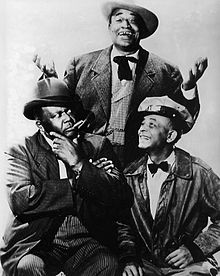Black sitcom
[5][6] The first television sitcom to principally portray black people, Amos 'n' Andy, was widely popular among diverse audiences.
Julia (NBC, 1968–71) and Room 222 (ABC, 1969–74) each had a black performer as first-billed lead of a racially mixed cast.
Several popular black sitcoms appeared in the 1970s, including Sanford and Son, Good Times, That's My Mama, The Jeffersons, and What's Happening!!
While the sitcoms were widely popular among diverse audiences, celebrated black culture and addressed social issues,[7] they were critiqued for an excess of loud and buffoonish characters, mostly in lower socioeconomic classes with the exception of The Jeffersons.
[9] Impressed with child actor Gary Coleman, the president of NBC created the sitcom Different Strokes specifically as a vehicle for him.
Roc, about a working-class family, was critically acclaimed for combining comedy and drama with a cast led by theater veterans.
[20] Civil rights organizations accused networks of denying minorities equal opportunity as well as a broader participation in general television programming.
By the early 2010s, Black sitcoms had faded from broadcast television but there were signs of a comeback on cable including The Game, canceled by The CW in 2009 then renewed on BET, A.N.T.
[21] In 2012, Tyler Perry's House of Payne surpassed The Jeffersons to become the longest-running sitcom with a predominantly African-American cast by number of episodes.
Abbott Elementary, a workplace comedy about the staff of a predominantly Black Philadelphia public school, debuted in 2021 on ABC.
The exposure of the black community on U.S. TV has been greater than that of other minorities but continues to reflect racial divisions within American society.
After U.S. networks were criticized by the National Association for the Advancement of Colored People (NAACP) for a lack of racial diversity, drama shows, such as The West Wing, began casting more black characters.
